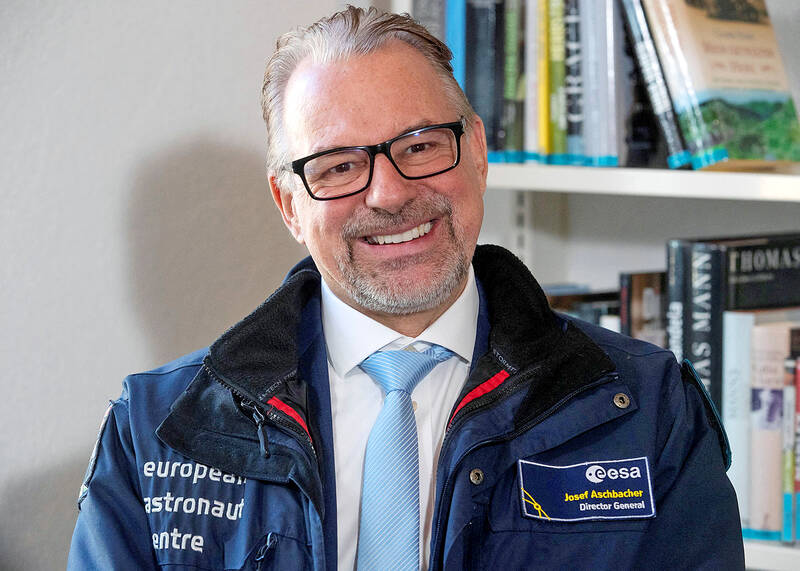Europe is being warned not to “miss the train” on the emerging space economy as more than 20 countries gather in Spain, expected to focus on funding for the delayed Ariane 6 rocket, as well as climate change and a possible new role in exploration.
The 22-nation European Space Agency (ESA) yesterday held ministerial talks in Seville, which is to be followed by a joint session today with the EU on competitiveness in space, dominated by the rapid growth of Elon Musk’s US-based rival SpaceX.
The two-day “Space Summit” comes as Europe faces a gap in autonomous access to space after delays to the new Ariane 6 rocket, combined with a grounding of the smaller Vega-C and severed access to Russia’s Soyuz due to the war in Ukraine.

Photo: Reuters
Ministers would try to resolve tensions among leading space nations France, Germany and Italy over launcher policy, including medium-term funding for Ariane 6, which is now due to stage its first test launch next year, four years behind the original plan.
France, where manufacturer ArianeGroup is based, wants extra funding to help absorb cost overruns, industry sources said.
French business newspaper La Tribune last week pegged the shortfall at 350 million euros (US$376 million).
Germany, which is often seen as reluctant to be paymaster for French industry, wants to stimulate its own emerging independent launch sector while Italy wants to protect its Vega-C project and make progress on exploration programs.
Sources last week said there had been some progress in unblocking a three-way standoff between Europe’s leading launch nations, but that ministers still faced sensitive budget talks.
Speaking ahead of the Seville meeting, ESA Director-General Josef Aschbacher declined to comment on the talks, but urged Europe not to repeat past mistakes in the technology sector.
“The space economy is growing... Not participating in this would be, in my opinion, strategically very difficult to justify,” Aschbacher told the AJPAE French media association.
Two decades ago, Europe had been not far from the US or Japan measured by patents and intellectual capability.
“Today, the biggest IT [information technology] companies are not in Europe. Some are in the US, some of them in China. We have missed the train. Quantum technology is a similar example where we’re now trying to catch up,” he said.
Europe has carved out a leading role in climate observation, navigation and space science, but has not targeted a prime role in human exploration, opting instead for a junior role in projects led by NASA or until recently Russia.
Ministers are expected to discuss an ESA proposal to invite private funding for a possible new spaceplane designed to carry cargo to and from the space stations of the future. The project could eventually be adapted to include human flight.
The proposal echoes the Hermes spaceplane, which never got off the drawing board. Europe’s answer to the US Space Shuttle was designed to carry three astronauts, but was scrapped in 1992.

PARLIAMENT CHAOS: Police forcibly removed Brazilian Deputy Glauber Braga after he called the legislation part of a ‘coup offensive’ and occupied the speaker’s chair Brazil’s lower house of Congress early yesterday approved a bill that could slash former Brazilian president Jair Bolsonaro’s prison sentence for plotting a coup, after efforts by a lawmaker to disrupt the proceedings sparked chaos in parliament. Bolsonaro has been serving a 27-year term since last month after his conviction for a scheme to stop Brazilian President Luiz Inacio Lula da Silva from taking office after the 2022 election. Lawmakers had been discussing a bill that would significantly reduce sentences for several crimes, including attempting a coup d’etat — opening up the prospect that Bolsonaro, 70, could have his sentence cut to

China yesterday held a low-key memorial ceremony for the 1937 Nanjing Massacre, with Chinese President Xi Jinping (習近平) not attending, despite a diplomatic crisis between Beijing and Tokyo over Taiwan. Beijing has raged at Tokyo since Japanese Prime Minister Sanae Takaichi last month said that a hypothetical Chinese attack on Taiwan could trigger a military response from Japan. China and Japan have long sparred over their painful history. China consistently reminds its people of the 1937 Nanjing Massacre, in which it says Japanese troops killed 300,000 people in what was then its capital. A post-World War II Allied tribunal put the death toll

A passerby could hear the cacophony from miles away in the Argentine capital, the unmistakable sound of 2,397 dogs barking — and breaking the unofficial world record for the largest-ever gathering of golden retrievers. Excitement pulsed through Bosques de Palermo, a sprawling park in Buenos Aires, as golden retriever-owners from all over Argentina transformed the park’s grassy expanse into a sea of bright yellow fur. Dog owners of all ages, their clothes covered in dog hair and stained with slobber, plopped down on picnic blankets with their beloved goldens to take in the surreal sight of so many other, exceptionally similar-looking ones.

‘UNWAVERING ALLIANCE’: The US Department of State said that China’s actions during military drills with Russia were not conducive to regional peace and stability The US on Tuesday criticized China over alleged radar deployments against Japanese military aircraft during a training exercise last week, while Tokyo and Seoul yesterday scrambled jets after Chinese and Russian military aircraft conducted joint patrols near the two countries. The incidents came after Japanese Prime Minister Sanae Takaichi triggered a dispute with Beijing last month with her remarks on how Tokyo might react to a hypothetical Chinese attack on Taiwan. “China’s actions are not conducive to regional peace and stability,” a US Department of State spokesperson said late on Tuesday, referring to the radar incident. “The US-Japan alliance is stronger and more